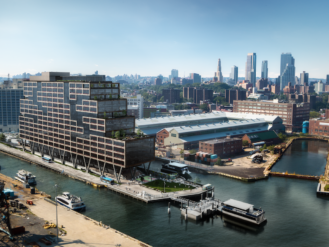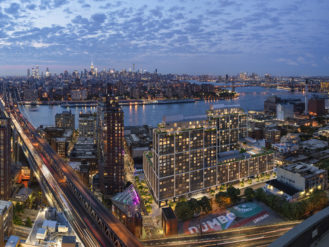An Insider’s Take on Brooklyn’s Real Estate Boom
Douglas Elliman's head of sales in the borough gives the lowdown on prices, competition and changing neighborhoods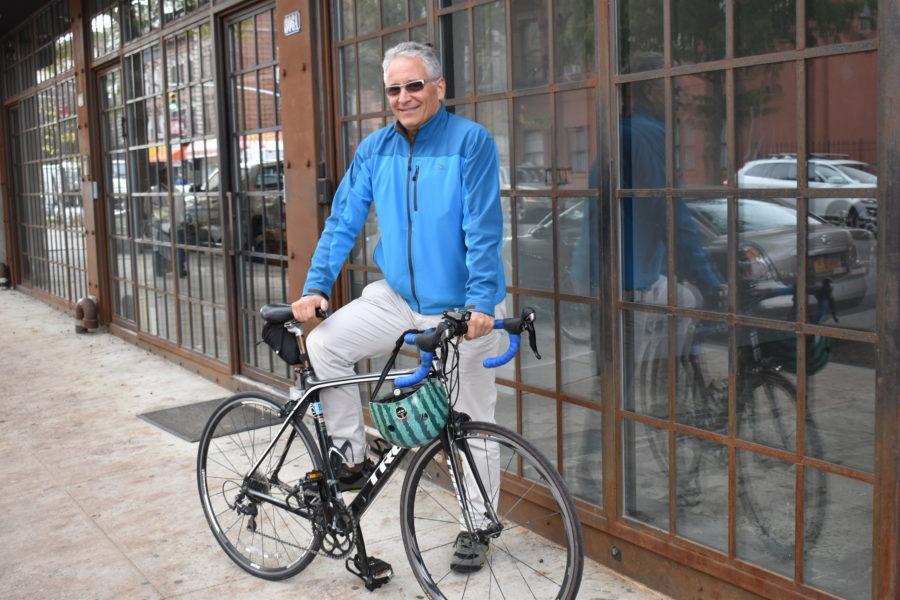
Max Dobens, chief of sales in Brooklyn for Douglas Elliman Real Estate, outside the firm's new office in Bedford-Stuyvesant (Photo by Steve Koepp)
Max Dobens is in the thick of Brooklyn’s real-estate boom, a business opportunity that has lured a wave of giant brokerage firms to the borough. As head of Brooklyn sales for Douglas Elliman Real Estate, he’s in the process of expanding the number of Elliman agents in the borough from about 230 when he took over the job two years ago to 350 to 400 by the end of next year. In June, Elliman bought Brooklyn Hearth Realty, with offices in Ditmas Park and Park Slope.
In his previous assignment, the 14-year Elliman veteran managed the firm’s West Village office, where he tripled the sales volume in three years. He had already bought a home in Crown Heights when Elliman asked him to make Brooklyn his business address as well. The Bridge talked with him recently in the backyard of Elliman’s new office, its eighth in Brooklyn, on Malcolm X Boulevard in Bedford-Stuyvesant. Excerpts:
How is the real-estate business different in Brooklyn vs. Manhattan?
It’s a little bit more chill here. Typically you don’t find the super classic, Type-A killer agent. More of that tends to gravitate towards the city, because that’s where all these massive, multimillion-dollar listings are. And Brooklyn actually is catching up in that sense. But I think it’s a little bit more of a relaxed atmosphere where you don’t have to be a shark to survive here. It’s more like, “Oh, let’s go to the local coffee shop that’s not a Starbucks and talk about what you want to buy.” It’s kind of a hybrid of suburbia and the city. A good hybrid.
How do you recruit new agents to the business?
I would look for people who have graduate degrees, like an MBA. Somebody who’s been in finance or banking or law. Because they know what hard work is. And the problem with of a lot of media, especially TV, is that you see all this lifestyles-of-the-rich-and-fabulous about real estate. So people think, “Oh, I’ll get my license and I’ll be on the web page and people will call me and I’ll make money.” And that’s so not how it works. The truth of the matter is, you’re fighting in the trenches.
How do rookie brokers start out?
Normally when you start out and you don’t have a book of business–and if you don’t want to eat tomato soup and mac-and-cheese for dinner for six months–the way to make money quickly is in rentals. Because you can post ads for open listings and you start running with customers and you can get a check in ten days. That’s a very brutal, hard way to start. But you have to do what you have to do.
But isn’t there a lot of competition among agencies to recruit agents?
Yeah. One of my biggest surprises when I came to Brooklyn was the aggressive recruiting and attempted poaching of agents, as opposed to the city. The companies want to be in Brooklyn because you have to be, and there’s a limited pool of experienced, quality agents here. It’s fiercer. So you have to shore up your people.
What’s your take on the Compass agency, which touts its technology?
They’re the shiny new toy. The same thing happened with Town [Residential]. When Town came to town, I had an agent come back from a party or something and they said “Oh my God, they have Molton Brown soap in their bathrooms.” And I thought to myself, “If that’s really important to you, then you should go over there.” Because it doesn’t matter what soap you have in the bathroom, it matters what the soul of the company is, and what the company can do for you as an agent.
Will Brooklyn home prices keep soaring?
I don’t think we’ve hit a stalling point yet. I think the recent Miller Samuel survey basically said that we’re in a healthy increase. So prices have gone up maybe like 8% to 9% [year over year], but they haven’t gone up 15% or 20% because that’s not healthy and that’s not sustainable. I think that things should increase gradually.
Brooklyn’s more affordable than the city, still. Although it’s getting more expensive. The lack of inventory here on the sale side is keeping pressure on. The money that the banks are lending is [to build] rental buildings. They don’t want to lend for condos. So that’s why you see a lot of these new buildings in Downtown Brooklyn that are rentals. If you want a condo and a two bedroom, there are choices, but they’re smaller buildings and there’s not a lot of them. I think it’s just kind of worked itself out, so it’s good.
What are these typical new Brooklyn condo buildings?
Well, I’ll speak by my own experience. I’m [living] on Park Place in Crown Heights. And I can throw a golf ball and hit five new development projects from the roof of my building. And it’s changing. And I see that. One of them is like a 25-unit building but the rest are nine-, ten-unit buildings. And that’s what I think people look for when they come to Brooklyn. They don’t want to live in the condominium that has 35 floors and a pool and all this kind of fancy-shmancy stuff. They want a more affordable monthly common charge. They don’t want skyscrapers. I remember asking agents in the West Village what makes the village special. And they said light. Because there’s not a lot of tall buildings.
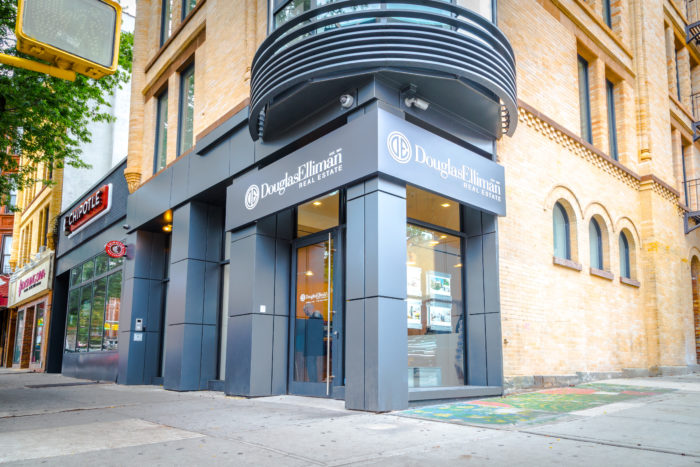
Elliman’s new office on Seventh Avenue in Park Slope, which is twice the size of its previous office, accommodating 50 to 60 agents (Photo courtesy of Douglas Elliman)
What neighborhoods do you see having the greatest business potential?
You’re starting to see people wake up and look at Ditmas Park and be like, “Oh my god, Marlborough Road … ” One of [our] agents is on a block where his husband inherited a house. And the people on that block are sitting on a gold mine. Because they’ve lived in these houses for generations, maybe paid $50,000, $75,000, $100,000 for a house that’s now worth $1.5 million to $3 million. It’s like potential energy, if you go back to science. The potential energy that’s locked up in all this property is amazing. And we want to be ready when that energy goes from potential to kinetic.
But there’s not much turnover in neighborhoods like that, right?
I’ll give you the four food groups for real estate: birth, death, divorce and relocation. Those things are going to happen regardless. The challenge in the city and in Brooklyn is that, let’s say, you’re a single person and you buy an apartment. You meet your life partner, fall in love, and you’ve been in that apartment for four years. It’s maybe almost doubled in value. But your salary doesn’t allow you to go buy a two bedroom because you just can’t support the mortgage. So that’s one of the factors why there’s not so much turnover. Yes you can sell, yes you can double your money–if you go to Florida. Or you go to Scranton or Armonk. So that’s an issue.
What about Brooklyn apartment rentals, which seem to be stabilizing?
The rents, if you look at the recent market report, are essentially flat. The apartment across the hall from me, a straight studio, started out with a rent of $2,095, I think, and just rented for $1,895. Three reductions, but they got it rented. So the market is speaking. There’s more stock, and because that apartment by definition wasn’t worth $2,100 a month, because nobody rented it.
When your company sets up shop in a new neighborhood, how do you avoid the impression that you’re just an agent of gentrification?
We hire smart, productive, respectful agents who know how to communicate with people.
You arrived here on your bike. Is that your preferred mode of transportation?
If you want to learn Brooklyn, you don’t get on a train and go underground and then pop up and you’re in a neighborhood. The way to learn Brooklyn is either walk around or ride around or drive around. For me, cycling through all of these neighborhoods, I understand what they are and how they’re changing. And that’s been very good for me to see.
People are looking [in different neighborhoods], they’re turning over the stones that haven’t been turned over before. Which is great. Brooklyn has an amazing housing stock.
Are there any hacks you can recommend to people who want to buy in Brooklyn but can’t quite afford it?
You team up with another family and you buy a two family. That’s one hack. There’s pros and cons to that. That’s kind of a business marriage. If the kid starts to play the drums, then there’s trouble. The other one is that you buy a two family and you rent out the bottom floor. Then you have an income that supports your mortgage.
So you just have to look. You need to be willing to do work. If you want a deal, don’t buy anything renovated. Because it’s not going to be a deal. You buy somebody else’s “problem” and then you fix it up. That’s how you get a deal.
So what’s the argument for why a home buyer needs an agent?
It sounds self serving, but when I was an agent and somebody called me up and they wanted to sell, before I called them back I would look and see what they paid for it. Nine times out of ten, if they didn’t have an agent on the buy side, they overpaid. I would ask them if they had an agent when they bought this. “Oh no, I negotiated myself,” all proud. And I’m like, “Dude, you know, this doesn’t make any sense.”
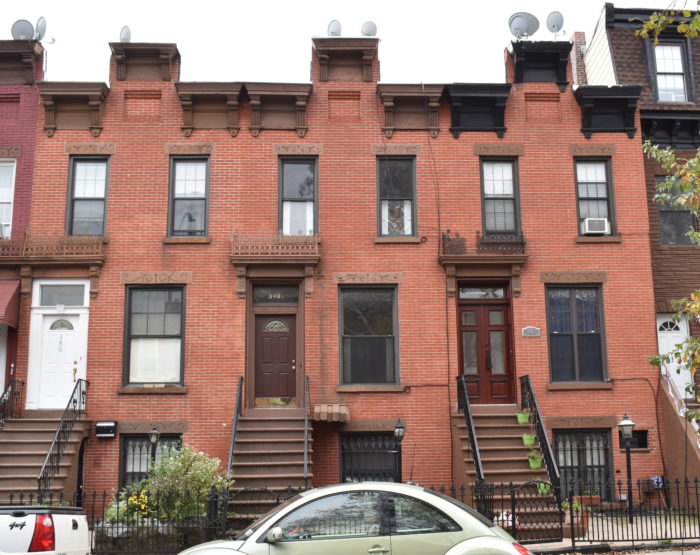
Row houses in Bedford-Stuyvesant, not far from Elliman’s new office
How do you pick a good agent?
You need to do your homework. Most people do more research on what car to buy than what agent they’re going to choose to sell the largest asset that they will ever own. Which to me is absurd. You don’t necessarily need neighborhood experience. That was always a frustrating thing for me when I was an agent because people said “Oh, you sell on the East Side, so I’m going to go with a West Side broker.” And my response was always, “Oh yeah, because the bricks on the West Side are so much different to sell than the bricks on the East Side.” I didn’t say that, but I thought that.
And neighborhoods can be learned. What you buy is someone who’s smart, who has negotiation skills, who’s experienced and who has integrity and is going to work for you. Do your homework and call people up: “Hey, how was your experience with this person?” Go on their website. Because if you look on the agent’s website, you’ll see how they market themselves, and how organized and competent they are.
What are the challenges on the selling side?
There are some agents who don’t belong to REBNY, the Real Estate Board of New York, and they don’t want to co-broke. They don’t want to share their listings. Let’s say I’m a seller and you’re an agent. “Oh, you’ll do it for 2%? Great!” [Instead of the traditional 6% commission.] Okay, that seller is naïve. Because they don’t understand how the thing works.
The person who’s going to sign up that listing for 2% is not going to work with anybody [else] who is an agent. They’re only going to take people who are not represented by a buyer’s agent. Now, by definition, the way to get the highest and best offer is to expose it to as many people as possible. And you do that by putting it on your company website, syndicating it out, and cooperating with the other agents.
Is there much negotiation on the 6% these days?
It depends. If you’re working with a company that’s Douglas Elliman, we try to go out there and get the 6%. Sometimes if you have somebody you’ve done business with in the past, or there are extenuating circumstances, you can go to 5%. But if you can’t justify that you’re worth 6%, then you kind of need to go home and rethink your life, young Padawan.
Why are there so many empty storefronts in Brooklyn these days?
As the guy who runs the region and has to look at all these leases, the rents that a lot of thee landlords are asking are only affordable by Fortune 100 companies. Like the Gap or something. And I think there’s a lot of retail pushback for what these landlords are asking. Things are going to stay vacant if it’s gone up a lot, people have signed leases, and then are kind of like, “I can’t make this work.”
I’ve seen some of our offices that have a rent of X and then their lease is coming up and then [the landlords] want to double it. So that’s why we choose other offices. They want what they want, and we’re going to pay what we’re going to pay. We’ll just go somewhere else.
Any other advice for people in the industry?
Expect the unexpected. Don’t think things are just going to be like they are. You have to be prepared for the unexpected and be able to move quickly and seize opportunities.
Brooklyn is changing, Brooklyn is dynamic. The price points aren’t what they are in the city, but it’s going through more of a metamorphosis than Manhattan is at the moment.






